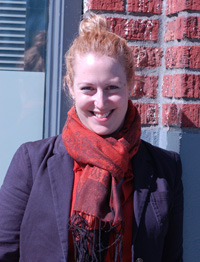By Joel Magalnick, Editor, JTNews
Growing up in Israel’s version of the suburbs, Ruth Carmi didn’t have a lot of exposure to ethnic diversity or economic or religious divides. Yet she always knew she wanted to attend law school.
“I always had that need to help others,” Carmi said.
When she moved to Jerusalem to attend the Hebrew University, however, the differences between the people just walking down the street came as a shock.
“It’s very tense,” Carmi told JTNews. “Coming from such a protected environment, I especially felt it.”
She attended two legal clinics while in law school, one on human trafficking and the other on violence against women. She had also volunteered at an abused women’s shelter during her army service. The experience affected her.
“While going to law school I was that weird girl who that would take only human rights courses,” she said. “I always thought that legal aid can make a world of difference.”
Carmi, 29, is currently a law fellow for the New Israel Fund’s Israel-U.S. Civil Liberties Law Program. She visited Seattle in May to speak with local attorneys about human rights issues in Israel for the Jewish Federation of Greater Seattle’s Cardozo Society.
Graduates from the program have gone on to win significant advances in Israeli society for women, Arab and Bedouin citizens, and the environment.
Between law school and her two-year fellowship, and after she completes it, she has been promoting the civil rights of Israeli Arabs through IRAC, the Israel Reform Action Center, the Reform movement’s Israel-based political arm.
In Israel in particular, where the religious authority holds a lot of power, Carmi sees inequities that might not otherwise be obvious.
“At the end of the day, if you’re talking about the separation between state and religion and saying, ‘What does this have to do with Palestinian rights?’” she said, “a lot of the things we’ve seen — resource allocation and how money is distributed — it’s emerging…that there is no separation and then these parties are discriminated against.”
Carmi sees connections between any oppressed group, because the people doing the oppressing have the same need for dominance.
“A place where have violence against women is a place where you end up having segregation,” she said.
The issue of segregation in Israel is familiar to anyone who was involved in the civil rights movement of the 1960s in the U.S.: IRAC was instrumental in persuading Israel’s Supreme Court earlier this year that bus companies cannot force segregation of women and men.
“The bus drivers cannot tell women they must go to the back,” Carmi said. “Not only is it illegal, but it’s demeaning, it’s humiliating and it’s against the basic law of human dignity, which is an important statement by the Supreme Court.”
Though the court decision and the years leading up to it created separations between many ultra-Orthodox communities and the rest of Israel’s citizens, Carmi said she has received calls from members of those communities, oftentimes in whispers, to express their appreciation for the ban.
“They would say, ‘We just wanted to thank you for voicing something that we’re not allowed to say in our society and for fighting segregation, which became so horrible, and we couldn’t do anything about it because we would be ostracized,’” Carmi said. “Now they are assured because they know someone else is fighting that battle.”
Though she said she believes the decision was right, she also admitted some doubts.
“Sometimes you feel like you’re maybe imposing your views on somebody else, but knowing that we are actually helping people in that society — they don’t want the segregation — was so meaningful,” she said.
During her fellowship in the “other” Washington, which has included an internship working with the American Civil Liberties Union, Carmi said she hopes to take back many of the tools and techniques that she learns from the ACLU to her home country to improve life there.
“They can use so many private law firms to engage in civil rights, which is a problem in Israel, and it’s a huge resource,” she said. Also, “I’ve seen them using class actions, which we don’t do very often, so I have a lot of legal ideas to implement.”
When she returns to Israel, Carmi would like to be able to do for Israeli society what in some cases she has been unable to do for herself: Civil marriage, for example.
“I had a Reform wedding and it was not formally recognized by the state, and I had to go to Cyprus since I wouldn’t get married in a rabbinical court,” she said.
Given the elevated enmity in public discourse and charges that the organizations Carmi works with are attempting to dilute Israel’s Jewish character, regardless of whether those charges are true she says she is energized to fight.
“There are a lot of challenges, but I couldn’t have it any other way,” she said. “I can sit at home and bicker about anything I find wrong, or I can do something about it.”
